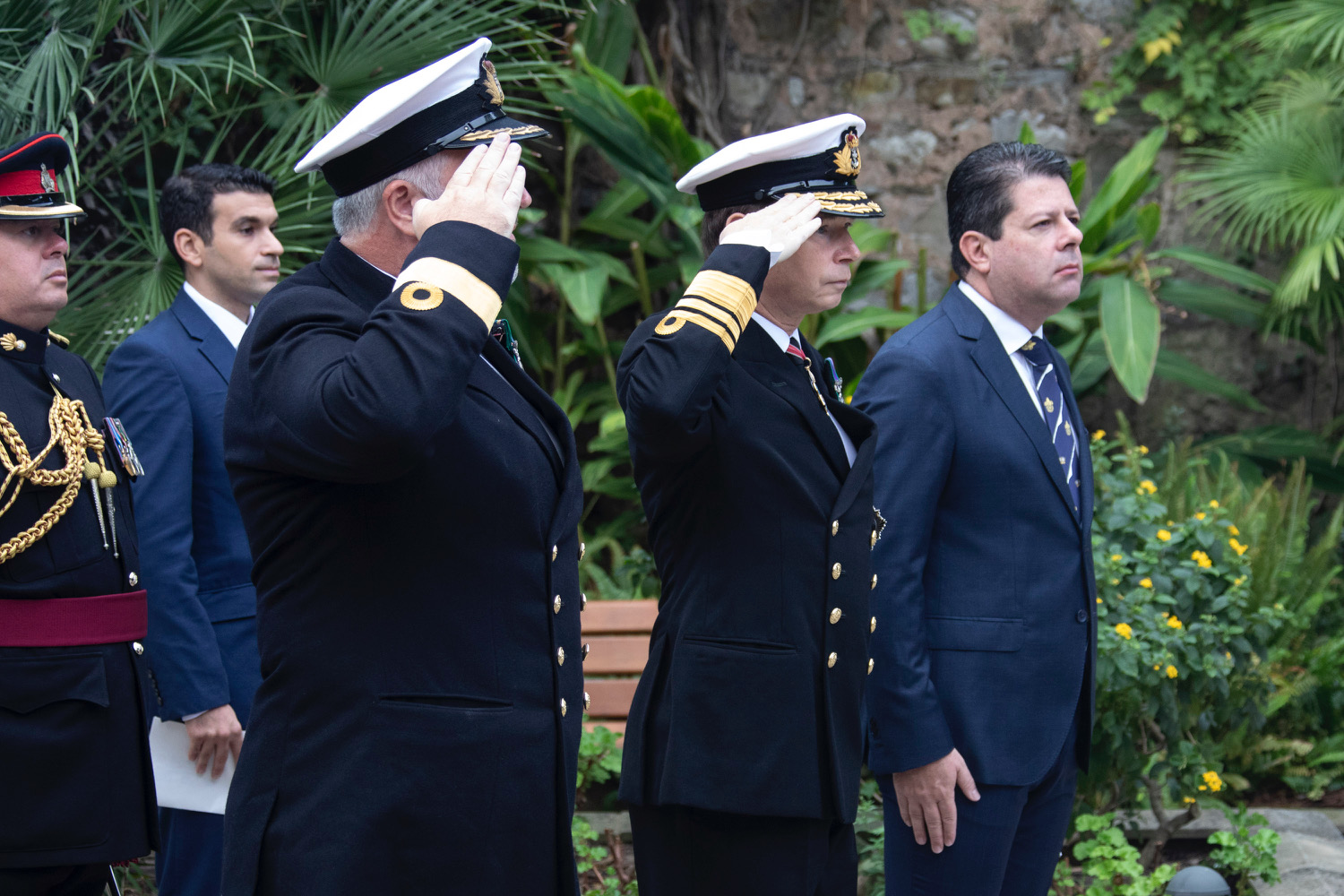
Gibraltar Holds Battle Of Trafalgar Remembrance Ceremony
To mark the 215th anniversary of the Battle of Trafalgar, and in compliance with current COVID-19 control measures, a ceremony was held at the foot of the Admiral Lord Nelson statue, near Gibraltar’s ancient city walls.
A statement from the MOD follows below:
With COVID-19 restrictions preventing the usual crowd from gathering His Excellency the Governor Vice Admiral Sir David Steel KBE DL led the ceremony by placing a wreath at the foot of Admiral Lord Nelson’s statue. Concurrently Commander Nick Baker Royal Navy, Commanding Officer Royal Navy and Lieutenant Commander Lloyd Cardy Royal Navy, Commanding Officer Royal Navy Gibraltar Squadron laid wreaths on the graves of those who died here in Gibraltar as a result of wounds sustained during the Battle. His Excellency read the dispatch from Admiral Collingwood to the Lieutenant Governor of Gibraltar:
‘Yesterday a Battle was fought by His Majesty’s Fleet, and a Victory gained, which will stand recorded as one of the most brilliant and decisive, that ever distinguished the British Navy… Our loss has been great in Men; but what is irreparable, and the cause of Universal Lamentation, is the death of the Noble Commander-in-Chief who died in the arms of Victory; I have not yet any reports from the ships…”
This was followed by the preamble which was read by the Honourable Fabian Picardo QC MP MA, Chief Minister and reminded everyone that ‘for over two centuries the Fleets of the Royal Navy have gathered at Gibraltar for exercise and training in time of Peace. Here in time of War, the ships have assembled before sailing to face the dangers of the seas and the violence of the enemy.’
This year’s Trafalgar address was delivered by Commodore Steve Dainton CBE Royal Navy, Commander British Forces who remarked on the proximity of Gibraltar to the cape of Trafalgar (70 miles). He said:
“Notwithstanding the impact of COVID, at this time each year in Royal Navy warships and establishments around the world, people will be recalling the Battle of Trafalgar, remembering the sailors that fell and especially Admiral Horatio Nelson who delivered the most brilliant and decisive victory that ever distinguished the British Navy The battle was strategically important as it denied Napoleon the opportunity to launch his invasion of Britain and prepared the ground for his final defeat at Waterloo some 10 years later. It also laid the foundations for a century of dominance of British sea power and heralded the start of the age of the British Empire.
But most of all, it was the manner in which Nelson led his men – what he expected of them and they of him. He was an innovator. Forever searching for new ways to gain a tactical
advantage, to find new methods of melding together individual men, officers and their ships into a single and cohesive force.
He regarded his Captains as more than just subordinates to carry out orders. They were individuals that he trusted to contribute to the battle as they saw fit, to seize the advantage when others might not have the full tactical picture. He took them into his confidence and, as a consequence, they knew his plan, his thinking and his expectations…
For 2 years, he had been readying his Fleet off the coast for battle. The ships and men were trained and tempered to a fine edge. The gun crews were finely drilled to deliver a withering rate of fie that the enemy could simply not match. And of course, the Fleet was in top fighting condition as they were able to rely on the bastion here in Gibraltar to keep the ships supplied and fitted out as we still do today with the Forward Mounting Base here in Gibraltar.
Over two centuries on, there remain many similarities between Nelson’s Navy and the Royal Navy of today. Fundamentally, human nature does not change and will still rely on the early inculcation of an ethos that binds a team together, to work for each other and for a common
purpose. That ethos gives us our enduring spirit, derived from our people’s loyalty to their ship, submarine, squadron and shipmates. That ethos is sustained by high professional standards, tough and regular training and exacting leadership. That ethos multiplies courage in adversity and gives the Royal Navy a determination to fight and win.
We look to our history to inspire us – our forebears remind us of our duty and the highest standards that must be achieved. That is why, every year, we come together to remember the Battle of Trafalgar – to remember the bravery and sacrifice of men from both sides of the battle – to remember the 58 nations that fought in the Fleets including nine Gibraltarians in the British Fleet – to remember Admiral Lord Nelson who died knowing he had won a remarkable and historic victory and thanking God that he had done his duty.”








